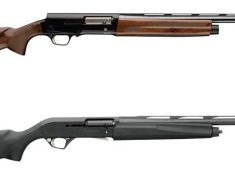“Empowering Responsible Ownership: Navigating the Legal Terrain of Shotguns”
Understanding the Second Amendment: The Foundation of Shotgun Ownership Rights
The Legal Landscape of Shotgun Ownership
Understanding the Second Amendment: The Foundation of Shotgun Ownership Rights
The right to bear arms, enshrined in the Second Amendment of the United States Constitution, serves as the bedrock of American gun ownership. This foundational principle has been subject to extensive legal scrutiny and interpretation, shaping the landscape within which shotgun owners exercise their rights. The Second Amendment’s concise wording has opened the door to various interpretations, but its core message remains clear: it protects an individual’s right to possess and carry firearms.
In the landmark 2008 case of District of Columbia v. Heller, the Supreme Court of the United States affirmed that the Second Amendment guarantees an individual’s right to possess a firearm unconnected with service in a militia, and to use that arm for traditionally lawful purposes, such as self-defense within the home. This pivotal decision underscored the personal right to gun ownership, thereby reinforcing the legal status of shotguns as a protected class of arms for lawful purposes.
Moreover, the technical nature of shotguns, often characterized by their smoothbore design and ability to fire a wide spread of projectiles, has historically placed them in a less contentious position compared to other firearms. Shotguns are commonly used for hunting, sport shooting, and home defense, activities that are widely recognized as lawful and legitimate under the Second Amendment. Consequently, shotguns have not faced the same level of regulatory scrutiny as some other firearms, such as assault rifles.
Nevertheless, the legal landscape of shotgun ownership is not without its complexities. Federal law, for instance, imposes certain restrictions on the ownership of shotguns. The National Firearms Act of 1934 (NFA) regulates the possession of short-barreled shotguns, which are defined as shotguns with barrels less than 18 inches in length or a total length of less than 26 inches. These firearms are subject to a rigorous registration process, and owners must navigate a series of bureaucratic steps to legally possess them.
Additionally, the Gun Control Act of 1968 (GCA) mandates that individuals purchasing shotguns from licensed dealers undergo a background check to ensure they are not prohibited from owning firearms. This act also sets forth various categories of individuals who are barred from gun ownership, such as felons and those adjudicated as mentally defective.
State laws further complicate the picture, as they can vary widely from one jurisdiction to another. Some states have enacted additional regulations, such as waiting periods for shotgun purchases, mandatory safety training, or the requirement of a state-issued firearm license. These state-level regulations can significantly impact the ease with which individuals can acquire and own shotguns.

Despite these regulatory frameworks, the legal landscape of shotgun ownership remains relatively permissive in comparison to other firearms. The technical and traditional uses of shotguns have helped maintain their status as a less controversial arm within the context of the Second Amendment. However, as with all areas of law, the landscape is subject to change. Legal challenges and shifts in public opinion can lead to new interpretations and regulations that may alter the rights of shotgun owners.
In conclusion, the Second Amendment provides a strong foundation for the rights of shotgun owners in the United States. While federal and state laws impose certain restrictions and requirements, the general legal consensus has favored the legitimacy of shotgun ownership for lawful purposes. As the legal landscape continues to evolve, it is essential for shotgun owners and enthusiasts to stay informed about changes in legislation and court rulings that may affect their rights and responsibilities.
State-by-State Guide to Shotgun Ownership Laws
The Legal Landscape of Shotgun Ownership
Navigating the complex terrain of shotgun ownership laws in the United States can be a daunting task for both seasoned enthusiasts and new firearm owners alike. The patchwork of regulations that govern the purchase, possession, and use of shotguns varies significantly from state to state, making it essential for individuals to familiarize themselves with the specific legal framework that applies to their jurisdiction.
At the federal level, the Gun Control Act of 1968 sets the baseline for shotgun ownership, establishing the legal age for purchasing a shotgun from a licensed dealer at 18 years old. However, when delving into state regulations, one quickly discovers a mosaic of rules that can influence everything from the type of shotgun you can own to the manner in which it can be carried.
For instance, some states impose additional background checks and waiting periods beyond federal requirements. California, known for its stringent gun laws, mandates a 10-day waiting period for all firearm purchases, including shotguns. In contrast, states like Texas have no such waiting period, allowing for more immediate transfer of ownership following the completion of a background check.
The type of shotgun and its features can also be subject to state-level scrutiny. States like New York and Massachusetts have specific definitions of what constitutes an “assault weapon,” and certain semi-automatic shotguns with features such as a pistol grip or a detachable magazine may fall under these definitions, leading to restrictions or bans. Conversely, many states have no such restrictions, allowing for a broader range of shotgun styles and features.
Carrying a shotgun also presents a varied legal picture across the country. Open carry of long guns, which typically includes shotguns, is generally more permissive than the open carry of handguns. However, some states require a permit for open carry or have designated areas where carrying firearms is prohibited. For those interested in concealed carry, it’s important to note that this typically applies to handguns and not shotguns, due to the impracticality of concealing a long gun.
Traveling with a shotgun between states adds another layer of complexity. The Firearm Owners’ Protection Act provides some protection for lawful gun owners transporting firearms across state lines, but it’s crucial to be aware of the laws in each state you’ll be passing through, as noncompliance can result in legal consequences.
For those looking to engage in hunting or sport shooting, state laws again play a pivotal role. Many states have specific regulations regarding the use of shotguns for hunting, including barrel length requirements, magazine capacity limits, and permissible ammunition types. Additionally, some states may require hunters to complete safety courses or obtain specific licenses before heading out into the field.
In summary, the legal landscape of shotgun ownership in the United States is characterized by its diversity. Prospective and current owners must exercise due diligence in understanding the laws that apply to them, which can often involve consulting state statutes, local ordinances, and even seeking legal advice. While the technical nature of these laws can be challenging, staying informed is the best way to ensure responsible and lawful shotgun ownership. As the legal framework continues to evolve, staying abreast of changes and updates is not just a matter of compliance, but also a reflection of the responsible gun owner’s commitment to safety and respect for the law.
The Impact of Federal Legislation on Shotgun Owners
The Legal Landscape of Shotgun Ownership
The impact of federal legislation on shotgun owners in the United States is a complex and evolving area of law that requires a nuanced understanding of both historical and current statutes. As a cornerstone of the Second Amendment, the right to bear arms has been fiercely protected and hotly debated, with shotguns often at the center of this discourse due to their widespread use for hunting, sport, and home defense.
Federal legislation has played a pivotal role in shaping the rights and responsibilities of shotgun owners. The Gun Control Act of 1968 (GCA) was a watershed moment in the regulation of firearms, including shotguns. This act established a comprehensive framework for the regulation of interstate and foreign commerce in firearms, including the licensing of manufacturers, dealers, and importers. For shotgun owners, the GCA set forth the legal age for purchasing a shotgun from a licensed dealer at 18 years and introduced record-keeping requirements that have been instrumental in tracing firearms used in crimes.
Moreover, the GCA categorizes certain shotguns as “destructive devices” if they have barrels less than 18 inches in length or an overall length of less than 26 inches. These short-barreled shotguns are subject to additional regulations under the National Firearms Act (NFA), which mandates registration and a rigorous background check process. The NFA’s influence on shotgun ownership cannot be overstated, as it imposes strict penalties for non-compliance, thereby ensuring that owners of these particular firearms are thoroughly vetted.
Transitioning to more recent legislation, the Brady Handgun Violence Prevention Act of 1993, commonly known as the Brady Act, introduced mandatory background checks for gun purchasers from licensed dealers. While primarily focused on handguns, the act also affects shotgun owners by requiring them to undergo these checks. The implementation of the National Instant Criminal Background Check System (NICS) under the Brady Act has been a significant step in preventing firearms, including shotguns, from falling into the hands of those prohibited by law from owning them, such as convicted felons or individuals with certain mental health conditions.
In addition to federal laws, shotgun owners must navigate a patchwork of state regulations that can vary widely from one jurisdiction to another. Some states have enacted laws that are more restrictive than federal statutes, imposing additional licensing requirements, waiting periods, or limitations on the types of shotguns that can be legally owned. This state-level variability necessitates that shotgun owners remain informed about the laws specific to their state of residence, as well as any states they may travel to with their firearms.
The legal landscape for shotgun owners is further complicated by ongoing debates and legislative proposals aimed at addressing gun violence. Advocates for stricter gun control measures often propose expanding background checks to include private sales and gun shows, limiting magazine capacities, or banning certain types of shotguns deemed particularly dangerous. Conversely, gun rights proponents argue that such measures infringe upon the constitutional rights of law-abiding citizens and emphasize the importance of focusing on enforcement of existing laws rather than creating new ones.
In conclusion, the impact of federal legislation on shotgun owners is a dynamic and multifaceted issue that requires vigilance and a proactive approach to compliance. As the legal framework continues to evolve, shotgun owners must stay abreast of changes to ensure they remain on the right side of the law. By understanding the intricacies of federal and state regulations, responsible shotgun owners can continue to enjoy their firearms for legitimate purposes while contributing to the safety and security of their communities.
Navigating the Legal Requirements for Purchasing and Owning a Shotgun
The Legal Landscape of Shotgun Ownership
Navigating the legal requirements for purchasing and owning a shotgun can be a complex process, with regulations varying significantly from one jurisdiction to another. Understanding these laws is crucial for any prospective or current shotgun owner to ensure they remain on the right side of the law. This article aims to provide a friendly guide through the technicalities of shotgun ownership, highlighting the general steps and considerations involved in this process.
Firstly, it’s important to recognize that federal law sets the baseline for shotgun ownership in the United States. The Gun Control Act of 1968 mandates that individuals must be at least 18 years old to purchase shotguns from a licensed dealer. Additionally, buyers are required to pass a background check to screen for criminal history, mental health disqualifications, and other factors that might bar them from owning a firearm. This background check is facilitated through the National Instant Criminal Background Check System (NICS), which licensed dealers must consult before completing a sale.
Moreover, while federal law provides the foundation, state and local laws can impose additional restrictions or requirements. For instance, some states may require a waiting period between the purchase and the actual possession of a shotgun, intended to provide a cooling-off period for potential buyers. Others might mandate safety training courses or the acquisition of a firearm owner’s identification card. Consequently, it’s imperative for individuals to familiarize themselves with the specific laws in their state and locality to avoid any legal pitfalls.
Transitioning from the purchase to the ownership phase, it’s also essential to understand the legal responsibilities that come with possessing a shotgun. Safe storage laws are a key consideration, with some jurisdictions requiring that firearms be stored in a manner that prevents access by unauthorized users, particularly minors. These laws are designed to reduce the risk of accidental injury or the misuse of firearms by individuals not legally permitted to handle them.
Furthermore, transportation of shotguns is another area governed by a mix of federal, state, and local regulations. Typically, firearms must be unloaded and stored in a locked container when transported, although the specifics can vary. For example, some areas may have more stringent rules about the visibility of firearms in vehicles or the proximity of ammunition to the firearm during transport.
In addition to these regulations, it’s also worth noting that certain types of shotguns may be subject to additional controls. The National Firearms Act (NFA) regulates shotguns with barrels shorter than 18 inches or an overall length less than 26 inches. These are classified as “short-barreled shotguns” and require a special tax stamp and registration with the Bureau of Alcohol, Tobacco, Firearms and Explosives (ATF). The process for obtaining an NFA item is more rigorous and includes a thorough background check, fingerprinting, and a longer waiting period.
In conclusion, while the legal landscape of shotgun ownership may seem daunting at first glance, a methodical approach to understanding and complying with the laws can make the process manageable. Prospective and current owners must take the initiative to educate themselves on the federal, state, and local regulations that apply to them. By doing so, they not only ensure their legal compliance but also contribute to the responsible and safe use of shotguns in their communities. As with any legal matter, when in doubt, consulting with a legal expert or local law enforcement can provide clarity and peace of mind for those navigating the intricacies of shotgun ownership.
Legal Considerations for Shotgun Owners: Storage, Transportation, and Use
The Legal Landscape of Shotgun Ownership
Navigating the legal considerations for shotgun owners is a critical aspect of responsible firearm ownership. Understanding the nuances of storage, transportation, and use is not only a matter of compliance but also one of ensuring safety for the owner and the community at large. The technicalities of the law can be complex, but with a friendly guide, shotgun enthusiasts can confidently manage their legal responsibilities.
When it comes to storage, the law typically mandates that firearms be kept in a secure and safe manner to prevent unauthorized access, particularly by children or individuals prohibited from firearm possession. This often translates into the requirement for gun safes or lockable cabinets. Some jurisdictions may specify the type of locking mechanism or the standards that the storage unit must meet. Additionally, certain areas may require that the ammunition be stored separately from the firearm itself, further reducing the risk of accidental discharge or misuse.
Transitioning from storage to transportation, the legal landscape shifts focus to how shotguns can be moved from one location to another. Generally, firearms should be unloaded during transit, and in many cases, they must be kept in a locked container. This container is often required to be hard-sided and secure enough to prevent access by anyone other than the owner. The specifics can vary widely, with some regions allowing transportation in a vehicle’s trunk without a locked container, while others may have more stringent requirements. It’s also important to note that crossing state lines can introduce a whole new set of regulations, as each state has its own laws regarding firearm transportation.
The use of shotguns, whether for hunting, sport shooting, or self-defense, is perhaps the most regulated aspect of shotgun ownership. Each activity comes with its own set of rules and guidelines. For hunters, this means adhering to hunting seasons, obtaining the proper licenses, and following game laws that dictate what can be hunted, when, and with what type of shotgun and ammunition. Sport shooters must comply with range rules and often need to demonstrate knowledge of safe handling procedures. Those owning shotguns for self-defense purposes must be acutely aware of the legal standards for the use of lethal force, which vary significantly and can have profound implications in the event of a shooting.
Moreover, the legal landscape is not static; it evolves with legislative changes and court rulings. Staying informed about current laws and proposed legislation is essential for shotgun owners. This can involve joining local firearm advocacy groups, subscribing to legal updates, or consulting with legal professionals specializing in firearm law.
In conclusion, the legal considerations for shotgun owners regarding storage, transportation, and use are intricate and vary by location. Owners must be diligent in understanding and complying with these laws to ensure the safety and legality of their actions. By taking the time to properly secure, transport, and use their shotguns within the confines of the law, owners can enjoy their firearms responsibly and contribute to a culture of safety and respect for the power that comes with shotgun ownership. As with any legal matter, when in doubt, seeking professional advice is always a prudent course of action to navigate the ever-changing legal landscape of shotgun ownership.






